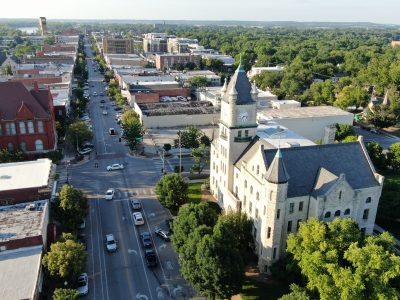Douglas County orders dine-in restaurants, libraries to remain closed through May 17

photo by: Jackson Barton/Journal-World File Photo
The Douglas County Courthouse and downtown Lawrence are pictured in an aerial photo Saturday, July 13, 2019.
Story updated at 4:41 p.m. Friday
Douglas County health officials have ordered restaurants to continue with carryout-only services and local libraries to remain closed through May 17 to continue preventing the spread of the COVID-19 pandemic.
But most retailers that previously have been closed as “nonessential businesses” will be allowed to reopen, as long as they follow certain guidelines created by the state. That means businesses ranging from clothing stores to jewelers could reopen Monday, as long as they maintain social-distancing practices and don’t allow groups of 10 or more people to congregate closely together in their establishments.
The Douglas County order came one day after Gov. Laura Kelly announced a phased plan to begin reopening the Kansas economy. In the initial phase of the reopening plan, which takes effect May 4, local health officials across Kansas have the ability to be more restrictive than the base guidelines set out in Kelly’s plan.
Nothing in the Douglas County order, however, changes a list of businesses that Kelly on Thursday said must remain closed for the time being. Those include barbers, salons, theaters, casinos, fitness centers and a handful of other businesses that involve crowds or that by their nature put people in close proximity to one another.
In the statewide plan, restaurants could theoretically open Monday as long as they didn’t seat tables with more than 10 people and kept tables six feet apart. Douglas County’s local health officer, Dr. Thomas Marcellino, said allowing restaurants to open for in-person dining so soon wasn’t in line with a safe strategy to mitigate the spread of the virus.
“At this point, as we look to enact a safe and smart reopening, we believe continuing a mitigation strategy related to gatherings that can occur at restaurants and libraries is necessary to contain the coronavirus in addition to the restrictions in the Governor’s plan,” Marcellino said in a statement Friday. “Like the Governor’s plan outlines, our timeline for advancing in phases is dependent on Douglas County residents cooperating with restrictions that are still in place, practicing good social-distancing measures and wearing masks or cloth face coverings in public.”
The decision does not affect restaurants’ ability to continue providing carryout or curbside services.
The implementation of phases 2 through 4 of Kelly’s plan is staggered every two weeks between May 18 and June 15. Kelly said Thursday that she would review Kansas’ progress in mitigating the virus’ spread before officially implementing a new phase of reopening.
Phase 2 of the plan allows for bars and nightclubs to begin operating in-house service at 50% capacity, salons and barbershops to open, casinos to open with proper cleaning and social distancing guidelines, and community centers and child care facilities to begin resuming services. Gatherings will be limited to fewer than 30 people during this phase.
Phase 3 of the plan, which can begin no sooner than June 1, is when restrictions will be lifted to a greater extent. Gatherings of up to 90 people will be allowed, employers will no longer be advised to have workers operate remotely, and nonessential travel will no longer be discouraged.
June 15 is the earliest date that Phase 4 of the plan could begin. In this phase, nearly all restrictions will be phased out, though people will still be encouraged to practice social distancing on their own.
Sally Zogry, executive director of Downtown Lawrence Inc., told the Journal-World that local restaurants likely weren’t surprised by the county’s decision and noted that several restaurants had announced prior to Kelly’s reopening plan that they would keep their dining rooms closed through May in the interest of safety.
“I think most restaurants with whom I’ve been in close contact with were feeling like this might be the decision,” Zogry said. “When you have to reduce the size of your dining room so much, that’s not sustainable.”
As the month of May progresses, Zogry said she expects more Lawrence restaurants to gradually come back online for curbside and carry-out services.
“All of these business owners want to keep the public safe, but they want to keep their staff safe as well,” she said. “It’s a very complex undertaking.”
Also on Friday, LMH Health officials announced that beginning Monday, some units would begin offering nonemergency care again.
“The approach to reopening will be methodical and deliberate, and the most critical cases will receive priority,” hospital president and CEO Russ Johnson said in a news release. “This is not business as usual, and will not be for some time.”
Local health leaders said they did not plan to announce any additional health orders or restrictions before the statewide stay-at-home order expires on Monday.
The Kansas Department of Health and Environment on Friday confirmed 211 new cases of the virus, bringing the state’s cumulative total to 4,449. The state recorded one additional COVID-19-related death, bringing the statewide total to 130.
KDHE also confirmed 534 total hospitalizations from the respiratory virus out of 3,204 cases where data is available — a rate of 16.7%, the lowest since the outbreak started in March. Of those hospitalized, 206 have required admission to an intensive care unit, and 96 have had to be put on a ventilator.
At least 280 patients have been discharged from Kansas hospitals, though the department acknowledges it could be more.
Kelly announced earlier in the week that Kansas would receive an influx of 550,000 COVID-19 test kits in the coming weeks, and further clarified in her Thursday address that the state had multiplied its testing supplies by a factor of 18 just in the last week.







